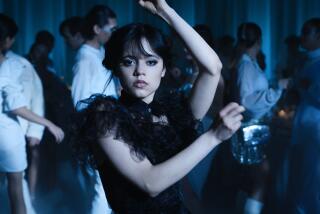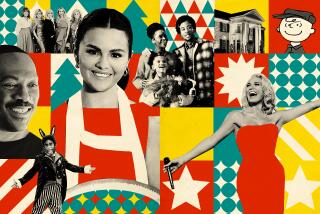In TV’s classics, God does cameos
- Share via
MY FAMILY doesn’t watch much television. No reality shows, no sitcoms, no “buzz” programs. It’s not a hard-and-fast rule. It’s just that not much on television grabs us.
But my wife and I do love to expose our kids to to the “classic” shows available on such cable channels as TV Land. We loved the shows as kids, and our kids, ages 12 and 9, seem to appreciate them too.
We’ve all noticed something common to several of these classic shows: They acknowledge God.
In the urban comedy “Good Times,” the family says grace before dinner. In their kitchen, a picture of Jesus hangs on the wall. In “The Andy Griffith Show,” grace is also said at mealtimes, and Aunt Bee tells Andy in one episode that she “dropped to her knees and thanked God” for the opportunity to come help raise her nephew, Opie.
In “Little House on the Prairie,” references to religion and faith are less subtle because life on the prairie in the 1800s, after all, was steeped in religious faith. That said, the poignancy of a wife pleading with her family not to work on Sunday because it is “the Lord’s day” seems exotic in our day of constant communication and double-ended candle burning.
What about the other shows I enjoyed watching growing up in the 1970s? Was our family’s sample size of TV classics unrepresentative?
Apparently not.
The ultra-cool Fonzie of “Happy Days” says grace at the table of the Cunningham family and reaches out to God while visiting his friend Richie in a hospital after Richie is in a serious motorcycle accident.
Maude famously admonishes her husband, Walter (and anyone else who crosses her), “God’ll get you for that.”
I even remember the “Partridge Family” attending church and ending up performing a song for the congregation.
These shows’ references to religion, comedic and serious, are not woven into story lines with heavy-handed intent. Religion is not their focal point, as it was, say, in “The Flying Nun.” Rather, they subtly reflect their characters’ belief that they answer to something higher.
These sitcoms’ references to faith are an important reason why many of the old shows hold up today.
Obviously, the TV shows were good too. Created under different rules, they were given a chance to grow, to stumble and to recover -- and to take chances. They were put together by seasoned professionals.
But their occasional nod to religious beliefs added something that helps them remain relevant. We believe in these show’s characters because they believe in something. Faith gives them personal depth, something lacking in today’s detached, self-absorbed culture in which Paris Hilton has replaced Mary Tyler Moore.
I bet “Happy Days” will be on television in 30 or 40 years. I’m not nearly as confident that any current show will have that kind of staying power, except for one that’s never feared to include religion in the story line: “The Simpsons.” Sure, religion is often a target but, like the TV classics, “The Simpsons” acknowledges that religion is part of life -- and that it’s a good thing for people to think about a power higher than they are.
Which, I admit, gives me faith in the medium.
More to Read
The complete guide to home viewing
Get Screen Gab for everything about the TV shows and streaming movies everyone’s talking about.
You may occasionally receive promotional content from the Los Angeles Times.






